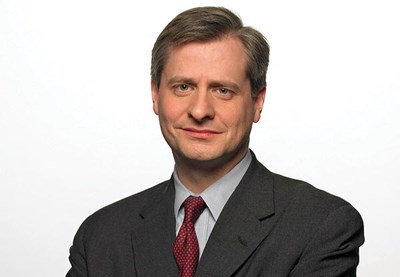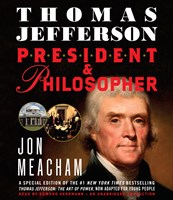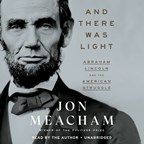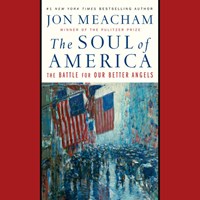Get our Newsletter
-
- Reviews
- Narrators
-
Features
- Audiobook ClubStart a conversation with your book club
- Best Audiobooks2023 Best Audiobooks
- ArticlesDiscover the diverse voices of audiobooks
- NarratorsSpotlight on popular narrators
- AuthorsAuthors talking about their audiobooks
- Upcoming TitlesFind upcoming audiobook release announcements
- Kids and TeensListening selections for kids & teens with age levels
- Audie Awards 2024 Audie Awards
- Subscribe
- About
- Articles
Talking with Jon Meacham
Our nation has always had a place in its culture for public historians. These are people like Barbara Tuchman, Theodore White, and David McCullough, who can make history come alive for the general reader while also producing books that are rigorously researched and connect the past with the present.
Welcome to the club, Jon Meacham.
Not yet 45, Meacham is an executive editor at Random House, a former co-anchor of the public affairs broadcast “Need to Know on PBS” and former editor of NEWSWEEK. His book, AMERICAN LION: ANDREW JACKSON IN THE WHITE HOUSE, was published by Random House in 2008 and in 2009 was awarded the Pulitzer Prize. Meacham is also the author of two other New York Times bestsellers--AMERICAN GOSPEL: GOD, THE FOUNDING FATHERS, AND THE MAKING OF A NATION, and FRANKLIN AND WINSTON: AN INTIMATE PORTRAIT OF AN EPIC FRIENDSHIP, about the relationship between Roosevelt and Churchill, which was named a book of the year by the Los Angeles Times and won the Churchill Centre’s 2005 Emery Reves Award for the best book of the year on Churchill.
Meacham’s latest book, THOMAS JEFFERSON: THE ART OF POWER, is not just another biography of our third president. He focuses on Jefferson the politician and philosopher and adds texture to what we already know about this complex man. “My goal was to try and walk with Jefferson and see things from his perspective, who his mentors were and how his education affected him,” Meacham says.
“His presidency hasn’t translated as clearly to the public as his other accomplishments, but he was president during tumultuous times, and although he didn’t see himself as a successful executive, the public certainly did. After all, they elected Jefferson or Jeffersonian politicians in every election but one from 1800 to 1840.” He writes that Jefferson understood the art of compromise and governed as a Renaissance man, applying the arts and sciences to the political realm.
Meacham wants us to see Jefferson as a man of ideas and of the Enlightenment, but he also notes that Jefferson was a sensuous man with big appetites when it came to women, wine, and gaining life experiences. “We have an image of Jefferson as a clinical man who was somehow removed from emotion. I learned that he was intensely human and interested in other humans.
I could see myself having a glass of wine with him. I couldn’t say the same thing about George Washington.”
The audiobook is narrated by actor Edward Herrmann, whom Meacham requested. “I think he’s brilliant,” Meacham says. “He made the text better. The audiobook universe is so fascinating. I have never listened to a book I’ve also read and not had a different experience. Edward Herrmann is a central element of the authorial experience. He’s the translator. I had listened to his work before and knew what he could do. I respect the skills I don’t have that he does.”
For his efforts, Herrmann was awarded an Earphones Award for this book. To Meacham, that’s proof that the right narrator can enhance any written work. “I think serious readers value audiobooks. For a writer, it’s one of the only ways you can end up with a coauthor who is interpreting your words. I want people to feel that their investment in time and money is well spent. I want to repay that to the reader.”
All but one of Meacham’s previous books are on audio, but he wants all of his forthcoming books to be recorded as well as written. He knows that with all of the technology, there’s only so much mind space available for people to read or listen to or view specific media. With this book, he’s provided our minds, and ears, with an opportunity to learn and enjoy ourselves. --Robert I. Grundfest
FEB/MARCH 2013
© AudioFile 2013, Portland, Maine
Photo by Damien Donck
The latest audiobook reviews, right in your inbox.
Get our FREE Newsletter and discover a world of audiobooks.








